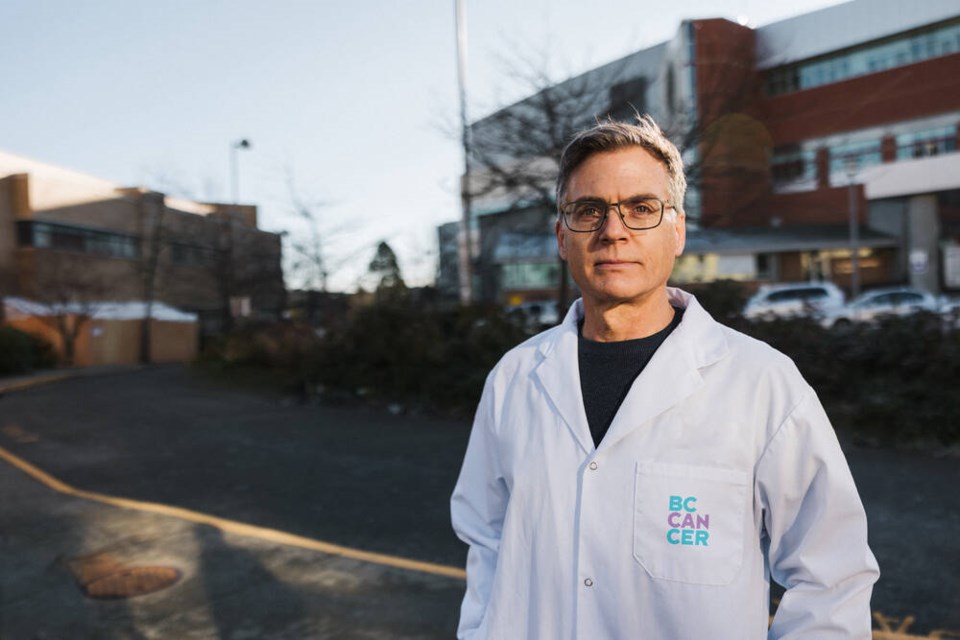A $2-million donation and a top academic position for one of Canada's leading immunotherapy scientists in Victoria will allow the expansion of clinical trials that are putting some end-stage cancer patients into remission.
Dr. Brad Nelson has been named B.C. Cancer Victoria’s Lynda and Murray Farmer Immunotherapy Research Chair, which means he can accelerate the centre’s CAR T-cell immunotherapy for aggressive and hard-to-treat cancers and mentor more rising researchers.
Immunotherapy is a type of cancer treatment that uses a patient’s own immune system to attack and destroy cancer cells.
“There’s huge potential for some breakthroughs in the clinic with these trials,” said Nelson, scientific director of B.C. Cancer’s provincial immunotherapy program.
The research chair position is funded by Lynda and Murray Farmer, who have contributed to cancer research in Victoria for more than two decades.
Lynda Farmer said she’s seen what Nelson has built through B.C. Cancer’s Deeley Research Centre, which she calls “an astounding entity in our community.”
“We’re so fortunate that he’s managed to build that program to the degree that it is now on a national, if not global stage,” she said. “There’s lots of sad cancer stories, but there’s a lot more happy ones today, and we are just really privileged to be a part of it.”
Nelson, who was recruited to Vancouver Island from the University of Washington in Seattle more than two decades ago, leads B.C. Cancer’s immunotherapy research program, which includes the 2019 Canadian-Led Immunotherapies in Cancer (CLIC) series of clinical trials in partnership with the Ottawa Hospital Research Institute, as well as the Arnie Charbonneau Cancer Institute at the University of Calgary.
Cellular immunotherapies such as CAR-T cell therapy involve extracting a patient’s immune cells, a type of white blood cell called T cells, genetically engineering them, and putting them back in the patient to see and destroy cancer cells.
B.C. Cancer’s program is one of the top two T-cell therapy programs in Canada, along with Princess Margaret Cancer Centre in Toronto, said Nelson, who credits local support for its growth.
Results from the first CLIC-01 trial showed a 43 per cent complete remission rate in leukemia and lymphoma patients who had exhausted all other options before starting the treatment.
The team recently launched CLIC-02, which targets a different protein on leukemia and lymphoma cells, opening the treatment to even more blood-cancer patients. The first five patients of the group of 12 adults and 12 pediatric patients in the first phase were recently treated.
A third trial, CLIC-03, set to start in early 2027, will target the deadliest and most challenging solid tumours, such as ovarian and pancreatic cancers.
“I’m super excited about the one against solid tumours, because we’ve got an especially potent-looking CAR T-cell product showing great results in pre-clinical models,” said Nelson.
Nelson said he is working with international partners so that after the initial phase of the CLIC-03 clinical trial, the CAR-T cell product can be used in co-ordinated clinical trials around the world so the best treatments are available faster.
Aside from expanding access to clinical trials for patients across B.C, the research chair position means dedicated funding to attract and mentor top scientific talent, from graduate students to postdoctoral researchers, and to secure national research grants and partnerships.
Nelson said he was concerned about the scarcity of cancer researchers in Victoria when he was recruited from Seattle in 2003 to become the founding director of B.C. Cancer’s Deeley Research Centre, a position he retains today.
Nelson said he was “touched” by the Farmers’ creation of the research chair.
“They’re literally linking their names with this chair and with the program and to me — that’s just such a huge statement of confidence and belief in what we’re doing,” said Nelson.
B.C. Cancer Foundation, which has launched a $6.8-million fundraising campaign to fund the immunotherapy clinical trials, hopes to sustain the research chair position over the long term.
William Litchfield, the foundation’s executive director for Vancouver Island, called immunotherapy one of the most promising areas in cancer research, adding the research chair position reinforces B.C. Cancer’s position as a national leader in the field.



